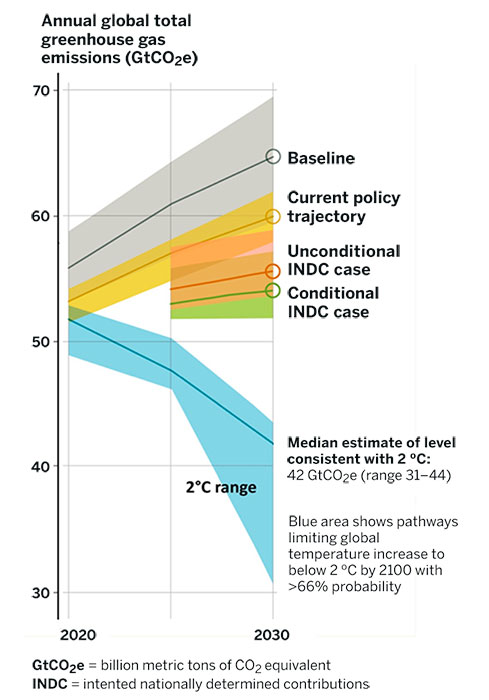Advertisement
Grab your lab coat. Let's get started
Welcome!
Welcome!
Create an account below to get 6 C&EN articles per month, receive newsletters and more - all free.
It seems this is your first time logging in online. Please enter the following information to continue.
As an ACS member you automatically get access to this site. All we need is few more details to create your reading experience.
Not you? Sign in with a different account.
Not you? Sign in with a different account.
ERROR 1
ERROR 1
ERROR 2
ERROR 2
ERROR 2
ERROR 2
ERROR 2
Password and Confirm password must match.
If you have an ACS member number, please enter it here so we can link this account to your membership. (optional)
ERROR 2
ACS values your privacy. By submitting your information, you are gaining access to C&EN and subscribing to our weekly newsletter. We use the information you provide to make your reading experience better, and we will never sell your data to third party members.
Environment
Once More On Climate Change
by Rudy M. Baum
September 10, 2012
| A version of this story appeared in
Volume 90, Issue 37
In early January 1999, NASA scientists determined that 1998 had been the hottest year on record to that time. In the Jan. 25, 1999, issue of C&EN, I wrote a Science Insights titled “Wintertime Reflections on Global Warming.” The essay concluded with the following paragraph:
“It has dawned on me over the past year, after a winter that didn’t occur and as one month after another rolled in as the warmest on record, that right now, this very year, humanity’s fortunes may have begun to shift and that a story was beginning to unfold that would dominate the news for the next few centuries. It won’t be a happy story. And I think future generations will hold us in deep contempt if we don’t at least begin to make the effort to alleviate the disaster that awaits them.”
The year 2005 surpassed 1998 as the hottest on record; it’s now clear that 2012 will surpass 2005. Each of the past 11 years (2001–11) is one of the 12 hottest years since instrumental temperature records began in the 19th century. The 20 hottest years on record have all occurred since 1987. These are facts—not speculation, not the result of a climate model—recorded from several thousand meteorological stations around the world.
On Aug. 27, scientists at the University of Colorado’s National Snow & Ice Data Center reported that Arctic sea ice extent fell to 1.58 million sq miles, 27,000 sq miles below the record low daily sea ice extent set on Sept. 18, 2007 (C&EN, Sept. 3, page 11). According to a University of Colorado press release, “Since the summer Arctic sea ice minimum normally does not occur until the melt season ends in mid- to late September, the CU-Boulder research team expects the sea ice extent to continue to dwindle for the next two or three weeks.” Again, this is a fact, not speculation or the result of a climate model.
So when climate-change deniers say, as they regularly do, that global temperatures have been falling, that is a lie. When climate-change deniers say, as they regularly do, that the extent of Arctic sea ice is increasing, that is a lie.
In my nearly nine years as editor-in-chief of C&EN, I have written numerous editorials on climate change. Too many, some readers insist. I should have focused more on chemistry, the chemical industry, the bleak job situation some chemists face. It is hard for me to understand this attitude. I wrote about those subjects, regularly, but climate disruption is the greatest challenge facing humanity today, and we continue to do next to nothing about it.
At the ACS national meeting in Philadelphia, Mario J. Molina, Distinguished Professor of Chemistry & Biochemistry at the University of California, San Diego, and winner of the 1995 Nobel Prize in Chemistry for his work on chlorofluorocarbons and stratospheric ozone depletion, gave a presidential keynote address on “Chemistry and Climate Change.” “Climate change is a grand challenge facing humanity, but it can be solved,” Molina said. “We have the solutions in hand.” Those solutions—including putting a price on carbon emissions, dramatically increasing investments in energy research, and expanding international cooperation—are likely to cost on the order of 1 to 2% of world GDP, he said, much less than the cost of unchecked climate change, which could easily reach 4 to 5% of world GDP.
At a presidential symposium in Philadelphia on “Communicating Controversial Science,” Nate Lewis, the George L. Argyros Professor of Chemistry at Caltech, gave a talk titled “The End of Fossil Fuels.” Lewis made a number of observations about Earth’s atmosphere and changing climate. The statements, he said, were true, but he acknowledged that they did not constitute proof that human activities were changing the climate. The question, he said, is, “Do we feel lucky?”
“Energy is the challenge for chemistry,” Lewis concluded. “Our energy past, present, and future lies with chemistry, but chemists have not yet fully embraced that challenge. If chemists don’t solve the energy challenge, in the one chance we get to solve it, it won’t be solved.”
I urge chemists to embrace that challenge for the sake of future generations.
Thanks for reading.
Views expressed on this page are those of the author and not necessarily those of ACS.





Join the conversation
Contact the reporter
Submit a Letter to the Editor for publication
Engage with us on Twitter